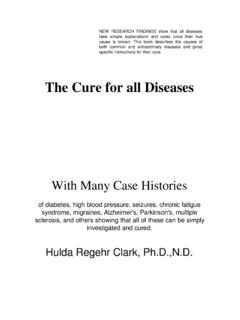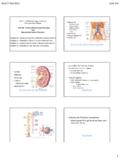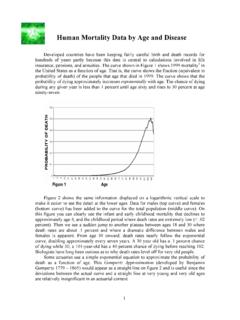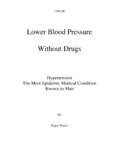Transcription of Palliative Care Module 5 - WHO
1 Palliative CareKnowledge into ActionCancer ControlWHO Guide for Effective ProgrammesWorldwide, millions of cancer patients could be relieved from pain and unnecessary suffering if they had timely access to good Palliative care . This Module explains how to develop an effective Palliative care programme within the context of a national cancer control programme. It is based on the Planning Module , which provides a comprehensive Planning Module , which provides a comprehensive Planningunderstanding of the overall cancer control planning process. Although this Palliative care Module focuses on cancer and does not specifically address other diseases, Palliative care Module focuses on cancer and does not specifically address other diseases, Palliative careit recognizes the need for developing Palliative care with a public health approach that targets all age groups suffering from diseases or conditions in need of Palliative care .
2 These conditions include HIV/AIDS, congestive heart failure, cerebrovascular disease, neurodegenerative disorders, chronic respiratory congestive heart failure, cerebrovascular disease, neurodegenerative disorders, chronic respiratory diseases and diseases of older people, among others. The principles guiding the development of Palliative care within a cancer control programme are very similar to those needed in providing Palliative care for people with other chronic World Health Organization estimates that million people died of cancer in 2005 and 84 million people will die in the next 10 years if action is not than 70% of all cancer deaths occur in low and middle income countries, where resources available for prevention, diagnosis and treatment of cancer are limited or nonexistent.
3 Yet cancer is to a large extent avoidable. Over 40% of all cancers can be prevented. Some of the most common cancers are curable if detected early and treated. Even with late cancer, the suffering of patients can be relieved with good Palliative control: knowledge into action: WHO guide for effective programmes is a series of six modules offering guidance on all important aspects of effective cancer control planning and implementation. ISBN 92 4 154734 5 Palliative CareKnowledge into ActionCancer ControlWHO Guide for Effective ProgrammesWHO Library Cataloguing-in-Publication DataPalliative care .
4 (Cancer control : knowledge into action : WHO guide for effective programmes ; Module 5.) care organization and administration. care utilization. therapy. care organization and administration. planning. health programs organization and administration. Health Organization. ISBN 92 4 154734 5 (NLM classifi cation: QZ 266) World Health Organization 2007 All rights reserved. Publications of the World Health Organization can be obtained from WHO Press, World Health Organization, 20 Avenue Appia, 1211 Geneva 27, Switzerland (tel.: +41 22 791 3264; fax: +41 22 791 4857; e-mail: Requests for permission to reproduce or translate WHO publications whether for sale or for noncommercial distribution should be addressed to WHO Press, at the above address (fax: +41 22 791 4806.))
5 E-mail: The designations employed and the presentation of the material in this publication do not imply the expression of any opinion whatsoever on the part of the World Health Organization concerning the legal status of any country, territory, city or area or of its authorities, or concerning the delimitation of its frontiers or boundaries. Dotted lines on maps represent approximate border lines for which there may not yet be full mention of specifi c companies or of certain manufacturers products does not imply that they are endorsed or recommended by the World Health Organization in preference to others of a similar nature that are not mentioned.
6 Errors and omissions excepted, the names of proprietary products are distinguished by initial capital reasonable precautions have been taken by the World Health Organization to verify the information contained in this publication. However, the published material is being distributed without warranty of any kind, either expressed or implied. The responsibility for the interpretation and use of the material lies with the reader. In no event shall the World Health Organization be liable for damages arising from its Cancer Control Palliative care Module was produced under the direction of Catherine Le Gal s-Camus (Assistant Director-General, Noncommunicable Diseases and Mental Health), Serge Resnikoff (Coordinator, Chronic Diseases Prevention and Management) and Cecilia Sep lveda (Chronic Diseases Prevention and Management, coordinator of the overall series of modules).
7 Kathleen Foley was the coordinator for this Module and Cecilia Sep lveda provided extensive editorial input. Editorial support was provided by Anthony Miller (scientifi c editor), In s Salas (technical adviser) and Angela Haden (technical writer and editor). Proofreading was done by Ann Morgan. The production of the Module was coordinated by Maria Villanueva and Neeta contributions for the Module were received from Kathleen Foley, Memorial Sloan-Kettering Cancer Center, input, help and advice were received from a number of people in WHO headquarters throughout the production of the Module : Caroline Allsopp, David Bramley, Rapha l Crettaz and Maryvonne Grisetti.
8 Cancer and Palliative care experts worldwide, as well as technical staff in WHO headquarters and in WHO regional and country offi ces, also provided valuable input by making contributions and reviewing the Module , and are listed in the Acknowledgements. Design and layout: L IV Com S rl, Morges, Switzerland, based on a style developed by Reda Sadki, Paris, France. Printed in SwitzerlandMore information about this publication can be obtained from:Department of Chronic Diseases and Health PromotionWorld Health Organization CH-1211 Geneva 27, SwitzerlandThe production of this publication was made possible through the generous fi nancial support of the National Cancer Institute (NCI), USA, and the National Cancer Institute (INCa), France.
9 We would also like to thank the Public Health Agency of Canada (PHAC), the National Cancer Center (NCC) of the Republic of Korea, the International Atomic Energy Agency (IAEA) and the International Union Against Cancer (UICC) for their fi nancial support. Cancer is a leading cause of death globally. The World Health Organization estimates that million people died of cancer in 2005 and 84 million people will die in the next 10 years if action is not taken. More than 70% of all cancer deaths occur in low- and middle-income countries, where resources available for prevention, diagnosis and treatment of cancer are limited or because of the wealth of available knowledge, all countries can, at some useful level, implement the four basic components of cancer control prevention, early detection, diagnosis and treatment, and Palliative care and thus avoid and cure many cancers, as well as palliating the control.
10 Knowledge into action, WHO guide for effective programmes is a series of six modules that provides practical advice for programme managers and policy-makers on how to advocate, plan and implement effective cancer control programmes, particularly in low- and middle-income is to a large extent avoidable. Many cancers can be prevented. Others can be detected early in their development, treated and cured. Even with late stage cancer, the pain can be reduced, the progression of the cancer slowed, and patients and their families helped to overviewCancer Control Series Introduction to the6 PreventionKnowledge into ActionCancer ControlWHO Guide for Effective ProgrammesPREVENTIONA practical guide for programme managers on how to implement effective cancer prevention by controlling major avoidable cancer risk DetectionKnowledge into ActionCancer ControlWHO Guide for Effective ProgrammesEARLY DETECTION A practical guide for programme managers on how to implement effective early detection of major types of cancer that are amenable to early diagnosis and screening.
















